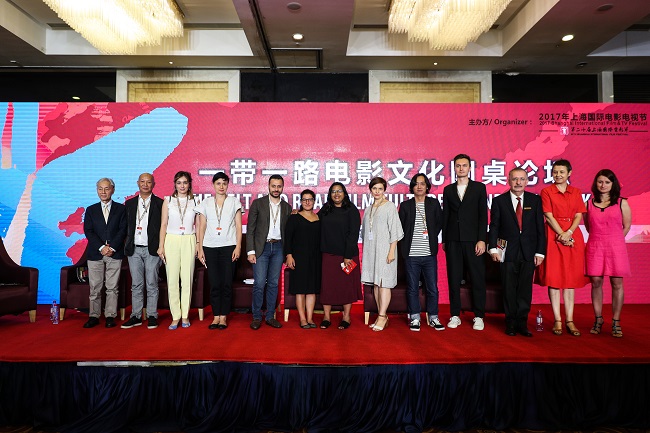2017-06-21
B&R region film festivals share challenges of attracting fans

Filmmakers and cinema industry experts from 12 countries discussed the importance of films and festivals. Pic by Wu Kai Yan Qingyang
Filmmakers and cinema industry experts from 12 countries discussed the importance of films and festivals in promoting culture to wider audiences yesterday at the ongoing 20th Shanghai International Film Festival.
The countries participating in the roundtable discussion all border along China\'s Belt and Road (B&R) infrastructure initiative and have rich film traditions and cultures.
Elise Jalladeau, director of Thessaloniki International Film Festival in Greece, explained two challenges faced by the Greek movie industry in recent years.
“Greece was in the middle of a big crisis, so the festival had to answer to the needs of industry and audiences," she said.
"It was a difficult time for filmmakers, but thanks to institutions like the film festival, we have a dynamic generation of new directors,” she added. “Another challenge was to convince audiences to go see the films, so we are now launching a study of their needs, profiles and demands.”
Rita Stanelyte, industry manager of Vilnius International Film Festival in Lithuania, said the festival has a big art house audience.
“In countries where there’s a film festival tradition, there are stronger art house audiences interested in watching quality films and celebrating cinema," she said.
"Our festival has been running since 1995 and our fans and audiences know that going to the festival means watching movies that will provide a cinematic experience.”
A challenge faced by the film industry is over production, Stanelyte noted.
“There are too many films and, if you talk about quality films, not so many are produced ... and they don\'t always reach wider audiences,” she said. “In Europe there are so many countries and different languages, and it\'s a challenge to travel the films around Europe."
Dita Rietuma, director of National Film Centre of Latvia, agreed there was over production of films. She said her organization\'s mission was to provide access to quality movies.
“It’s absolutely necessary to develop audiences who know how to watch quality films," she said. "Quality European films, quality Asian films and quality American independent films ... the festivals are the access gateway for audiences to them.”
Tibor Biro, director of Miskolc International Film Festival in Hungary, noted the local audience\'s main interest was in American films so art house cinema needed help from the government and institutions to exhibit films.
Anna E. Dziedzic, project manager of the Poland Film Commission, said that enhancing online platforms not only provided a place for people around the world to watch content, but also enabled audiences to learn more about, and engage with, filmmakers.
Diana Ashimova, co-founder of Kazakhstan Cinema LLP, said her organization was trying to spread inter-cultural communication and promote different films.
In Egypt, domestic movies command 60 percent of the box office. When the Cairo International Film Festival started four decades ago, its objective was to bring a wider variety of movies to the screen.
“We worked on building audiences, promoting different types of films, and establishing ties with different festivals and countries,” said Ahmed Shawky, assistant artistic director of the festival.
Dubai Film Market manager Ayesha Chagla said the Dubai International Film Festival had a mandate to encourage cultural understanding through film.
The Mumbai Film Festival is a younger event that faces similar problems of audience development.
“We are a country of many languages and film cultures," said creative director Smriti Kiran. "We focus on independent cinema in different languages and have so much to offer. Partnerships with other festivals are essential.”
